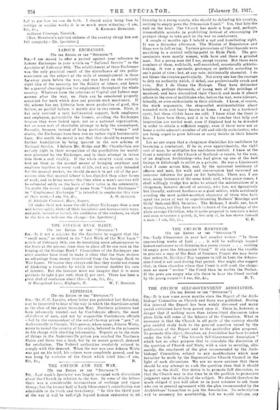CTo THE EDITOR Cr THE " SPECTATOR.")
Ste,--Last week's Spectator was largely occupied with discussions about the Church in relation to the war. In some of the letters there was it considerable intermixture of verbiage and vague theory; but the former half of Lady Glenconner's contribution was admirable in its truth and trenchancy. " In this the third year of the war it will be well-nigh beyond human endurance to sit listening to a young curate, who should be defending his country, reciting to empty pews the Athanasian Creed." Yes, that hits the nail on the bead. The Church has made a huge and, perhaps, irremediable mistake in prohibiting instead of encouraging its younger clergy to take part in the war as combatants.
A couple of mouths ago I beheld a sad and humiliating sight. It was a Saturday afternoon. The Mission of Repentance and Hope was in full swing. Various processions of Churchpeople were marching to a central rallying-point in Hyde Park. The pro- cessionists were mostly women, with here and there a grizzled man. Not a young man did I see, except curates. But there were numbers of them, well-built, well-nourished, occasionally athletic- leoking. It was a spectacle, grotesque or pathetic according to one's point of view; but, at any rate, intrinsically shameful. I do not blame the curates particularly. Not every one has the courage to defy an authority which, if defied, can professionally crush and - ruiu. But I do blame the Bishops. They have defrauded hundreds, perhaps thousands, of young men of the privilege of manhood, and have discredited their Church and made it almost odious in the eyes of multitudes who, before the war, were tolerant, friendly, or even enthusiastic in their attitude. I know, of course, the stock arguments, the shop-soiled sentimentalities about wounded souls and heavy hearts at home. I may be a hardened cynic, but these clichés leave me cold. I know what the front is like. I have been there, and it is in the trenches that help and inspiration are needed most, even if England had to be denuded in order to obtain a sufficient supply, even if there were not at home a quite adequate number of old and elderly ecclesiastics, who are being urged to grow lettuces or carry letters in their leisure
hours.
Let no one argue that a clergyman diminishes his usefulness by becoming a combatant. If he is, even approximately, the right sort of man, he multiplies his usefulness tenfold. 1 knew at the front a minister of the Church of Scotland—a cousin, by the way, of an Anglican Archbishop—who had given up one of the beet livings in Edinburgh to enlist as a private. lle was a Lieutenant when I came across him, and, by the universal testimony of officers and men, Ids walk and conversation had exercised an immense influence for good on his battalion. There are, I am sure, many instances of the same kind; and, when peace conies, I shall willingly trudge five miles to attend the ministrations of as clergyman, however devoid of oratory, who has, not figuratively but literally, endured hardness as a good soldier, while sedulously avoiding the most golden-moathed eloquence of those who hare spent the years of war in superintending Mothers' Meetings and. Girls' Soda-and-Milk Societies. The Bishops, I doubt not, know ninny things, but ilea- have much to learn of the psychology of the plain average Christian, who is quite prepared to venerate a saint and even reference a priest, if, but outy if, he has show n himself






































 Previous page
Previous page